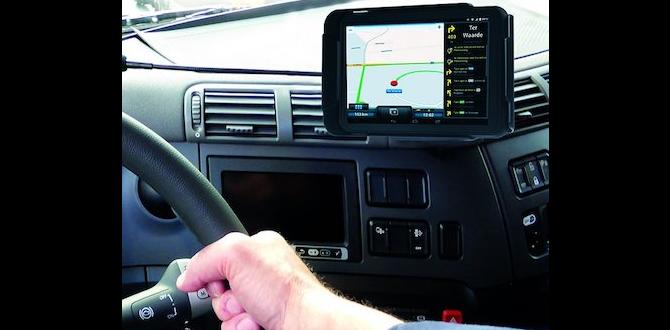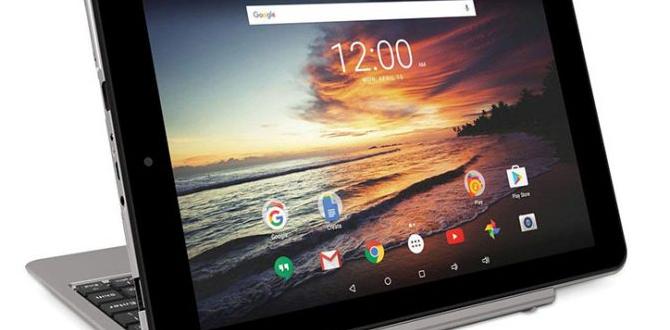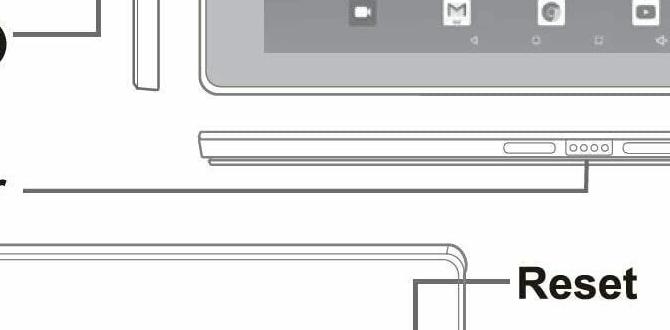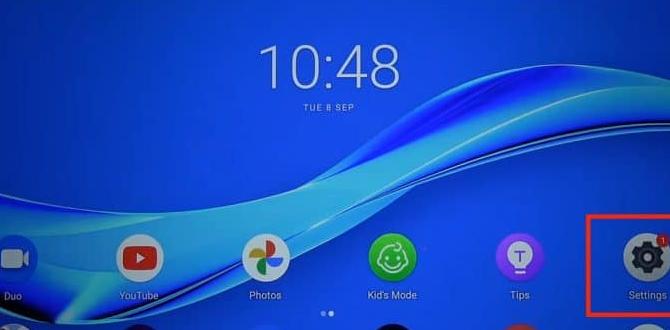Have you ever wondered how doctors and nurses keep track of important information so quickly? Tablets play a big role in this. They help medical staff do their jobs better and faster. In hospitals, having the right tools can make all the difference.
This guide explores the top tablets for hospital use. Each tablet has features designed for healthcare needs. You might be surprised to learn how these devices can improve patient care.
Imagine a busy doctor seamlessly checking medical records or a nurse easily updating patient notes. With the right tablets, this becomes the new normal. These devices are not just for gaming or browsing; they are vital tools in hospitals.
So, what makes a tablet suitable for healthcare? This guide will answer that question. Get ready to discover which tablets can enhance hospital work. You may find the perfect fit for any medical setting!
Top Tablets For Hospital Use Guide: Essential Features And Benefits

Top Tablets for Hospital Use Guide
Looking for the best tablets for hospital use? You’re in the right place. This guide reveals the features that make tablets effective in healthcare settings. Think about ease of use, durability, and battery life. Did you know that some tablets can even withstand drops or spills? Discover models that assist doctors in sharing patient info quickly. The right tablet can make a huge difference in patient care and workflow efficiency.Importance of Tablets in Healthcare
Role of technology in improving patient care. Advantages of using tablets in a hospital setting.Technology plays a big role in helping doctors and nurses care for patients better. Tablets in hospitals make it easy for healthcare workers to access important information right away. This saves time and helps keep patients safe. Here are some advantages:
- Quick access to patient records
- Easy communication among staff
- Better patient engagement
- Updates in real-time
Tablets can improve care and make everyone’s job easier. It’s like having a helpful friend right at your fingertips!
What are the benefits of using tablets in hospitals?
Tablets offer quick access to patient data, improve communication, and enhance patient engagement. They make workflows smoother and help in providing safer care.
Key Features to Consider in Hospital Tablets
Durability and resistance to hospital environments. Battery life and portability. Security features and data protection.Choosing the right tablet for hospitals is vital. Look for these key features:
- Durability: Tablets must resist drops and spills.
- Battery Life: Long-lasting battery supports busy hospital shifts.
- Security: Strong data protection keeps patient information safe.
With these essentials, tablets can improve efficiency and care in hospitals.
What should you consider about hospital tablets?
Consider durability, battery life, and security features when selecting a hospital tablet. Durable tablets support busy environments, while longer battery life ensures portability. Security features protect sensitive patient data.
Top Tablets Recommended for Hospital Use
Detailed reviews of leading tablet models. Comparison of specifications and features.Choosing the best tablets for hospitals is important for patient care. Here are three top models worth considering:
- Apple iPad Pro: Known for its speed and clear display, this tablet offers great apps for medical use.
- Samsung Galaxy Tab S7: This tablet has a strong battery and great features for multitasking. It runs smoothly, even with many apps open.
- Microsoft Surface Pro 7: This model acts like a laptop but is lightweight. It has a USB-C port for easy connections.
When comparing tablets, consider their screen size, battery life, and operating system. These features can make a big difference in hospitals. A well-chosen tablet can help doctors and nurses work better and improve patient care.
What should you look for in a hospital tablet?
Look for factors like speed, battery life, and display quality. Tablets should also support health apps to enhance patient management.
Case Studies of Successful Tablet Implementation in Hospitals
Examples of hospitals that improved efficiency with tablets. Patient care outcomes enhanced by tablet usage.Many hospitals are seeing big wins with tablet use. For instance, a leading hospital network improved its patient check-in process and reduced wait times by 30%. Another hospital reported enhanced patient care and communication among staff. Tablets helped keep everything organized and fast.
- Better communication between doctors and patients
- Faster access to medical records
- Improved tracking of medications
These changes lead to happier patients and better health outcomes. Overall, tablets can be game-changers for hospitals.
How do tablets help hospitals?
Tablets improve efficiency and patient satisfaction through quick access to data. They streamline processes, helping staff stay focused on care rather than paperwork.
Integration of Tablets with Hospital Systems
Compatibility with Electronic Health Records (EHR). Use of tablets in telemedicine and remote patient monitoring.Tablets are great friends to hospital systems. They can easily connect with Electronic Health Records (EHR), making patient information super accessible. Instead of flipping through stacks of papers, doctors can tap a screen. It’s like magic, but with fewer rabbits and more health data!
Tablets also shine in telemedicine. They let doctors chat with patients from miles away. Imagine a doctor in one city and a patient in another, having a virtual coffee date while discussing health! With remote patient monitoring, tablets can track health from home. This means fewer hospital visits, which is a win-win!
| Tablet Features | Benefits |
|---|---|
| Compatibility with EHR | Instant access to patient data |
| Telemedicine | Convenient doctor visits |
| Remote Monitoring | Fewer hospital trips |
Challenges and Considerations for Tablet Adoption in Hospitals
Common obstacles faced during implementation. Solutions to overcome resistance from staff and other stakeholders.Implementing tablets in hospitals is not always smooth sailing. One big hurdle is staff resistance. Some may feel comfortable with old methods and see change as scary, like a cat meeting a cucumber. Training is key here. Offer hands-on sessions to ease their fears and show how tablets can simplify tasks. Another challenge is ensuring that all tech plays nice together. Collaboration between IT teams and healthcare staff can help clear the fog of confusion.
| Challenges | Solutions |
|---|---|
| Staff resistance | Provide training and support |
| Integration issues | Encourage teamwork between departments |
By tackling these issues, hospitals can turn tablet adoption from a scary monster into a helpful sidekick! After all, who wouldn’t want a tech buddy to make life easier?
Future Trends in Hospital Tablet Technology
Innovations in tablet functionalities. Predictions for how tablets will evolve in healthcare settings.Hospital tablets are quickly becoming superstars in healthcare. Innovations keep popping up, turning these devices into must-haves for doctors and nurses. Imagine tablets that can remind staff when it’s time for a coffee break or those that make finding patient records as easy as pie! Predictions say we’ll see tablets getting even smarter, maybe even chatting with us! Let’s peek at the future with a quick look at some possible features:
| Feature | Description |
|---|---|
| Voice Activation | Tablets could listen to doctors, making hands-free work easier! |
| Augmented Reality | Doctors might use tablets to practice surgery in a virtual world before trying it out! |
| Super Battery Life | Imagine tablets lasting a full week—no more charging during shifts! |
With each passing year, the possibilities seem endless—smarter tablets could change hospital life for the better!
Conclusion
In conclusion, the best tablets for hospital use are lightweight, durable, and easy to clean. Look for features like long battery life and fast performance. These tablets help doctors and nurses share information quickly. To learn more, check online reviews and guides. Choosing the right tablet can improve hospital efficiency and patient care, so take the next step today!FAQs
What Are The Key Features To Look For In A Tablet Designed Specifically For Hospital Use?When choosing a tablet for hospitals, look for a strong casing to protect it from drops. It should be easy to clean so germs can’t stick around. A long battery life is important, so you don’t have to charge it often. Make sure the screen is bright and clear, so it’s easy to see. Also, it should connect to other hospital equipment easily.
How Do Different Operating Systems (Ios, Android, Windows) Compare In Terms Of Functionality And Compatibility With Hospital Software?iOS, Android, and Windows work differently with hospital software. iOS is smooth and safe but has fewer apps. Android has many choices and is flexible but may have security issues. Windows is widely used in hospitals, making it compatible with many programs. Each system has strengths, so the best choice depends on what a hospital needs.
What Are Some Recommended Tablets For Healthcare Professionals That Facilitate Patient Care And Data Management?Some good tablets for healthcare workers are the Apple iPad, Samsung Galaxy Tab, and Microsoft Surface. The iPad is easy to use and has many helpful apps. The Galaxy Tab has a big screen and is great for jotting down notes. The Surface is like a small computer, perfect for typing. All of these tablets help you take care of patients better and keep their information safe.
How Can Tablets Improve Communication And Collaboration Among Healthcare Teams In A Hospital Setting?Tablets can really help doctors and nurses talk and work together better. They let us share notes and patient information quickly. We can send messages right away, so nobody has to wait. With tablets, everyone gets the same up-to-date information. This helps us take better care of our patients!
What Security Measures Should Be Considered When Using Tablets In A Hospital Environment To Protect Patient Data?When using tablets in a hospital, we must keep patient data safe. First, use passwords to lock the tablets. This way, only the right people can open them. Next, we should always update the tablet’s software to fix any problems. Finally, don’t share personal information on public Wi-Fi. This keeps data private and secure!
Your tech guru in Sand City, CA, bringing you the latest insights and tips exclusively on mobile tablets. Dive into the world of sleek devices and stay ahead in the tablet game with my expert guidance. Your go-to source for all things tablet-related – let’s elevate your tech experience!





